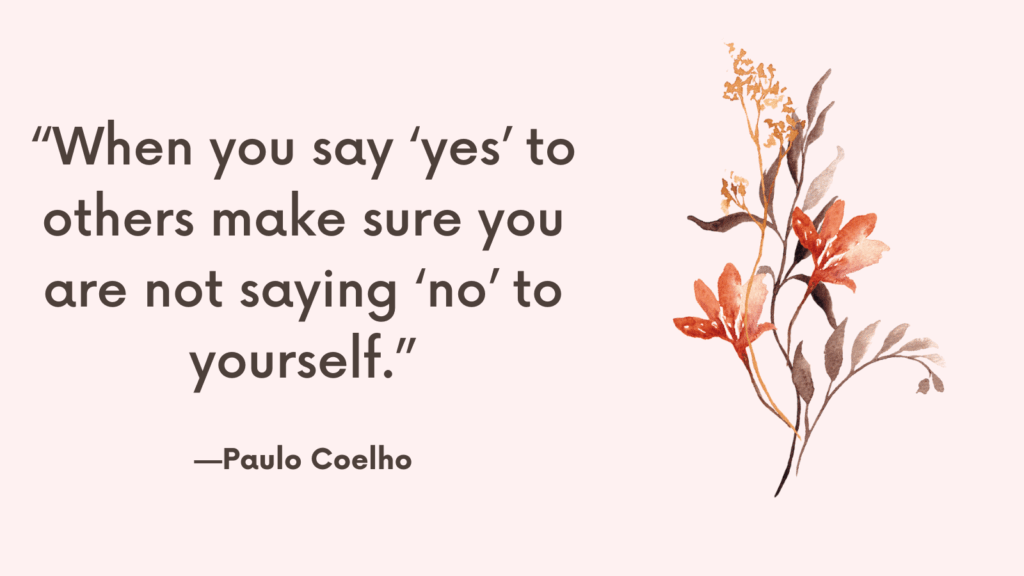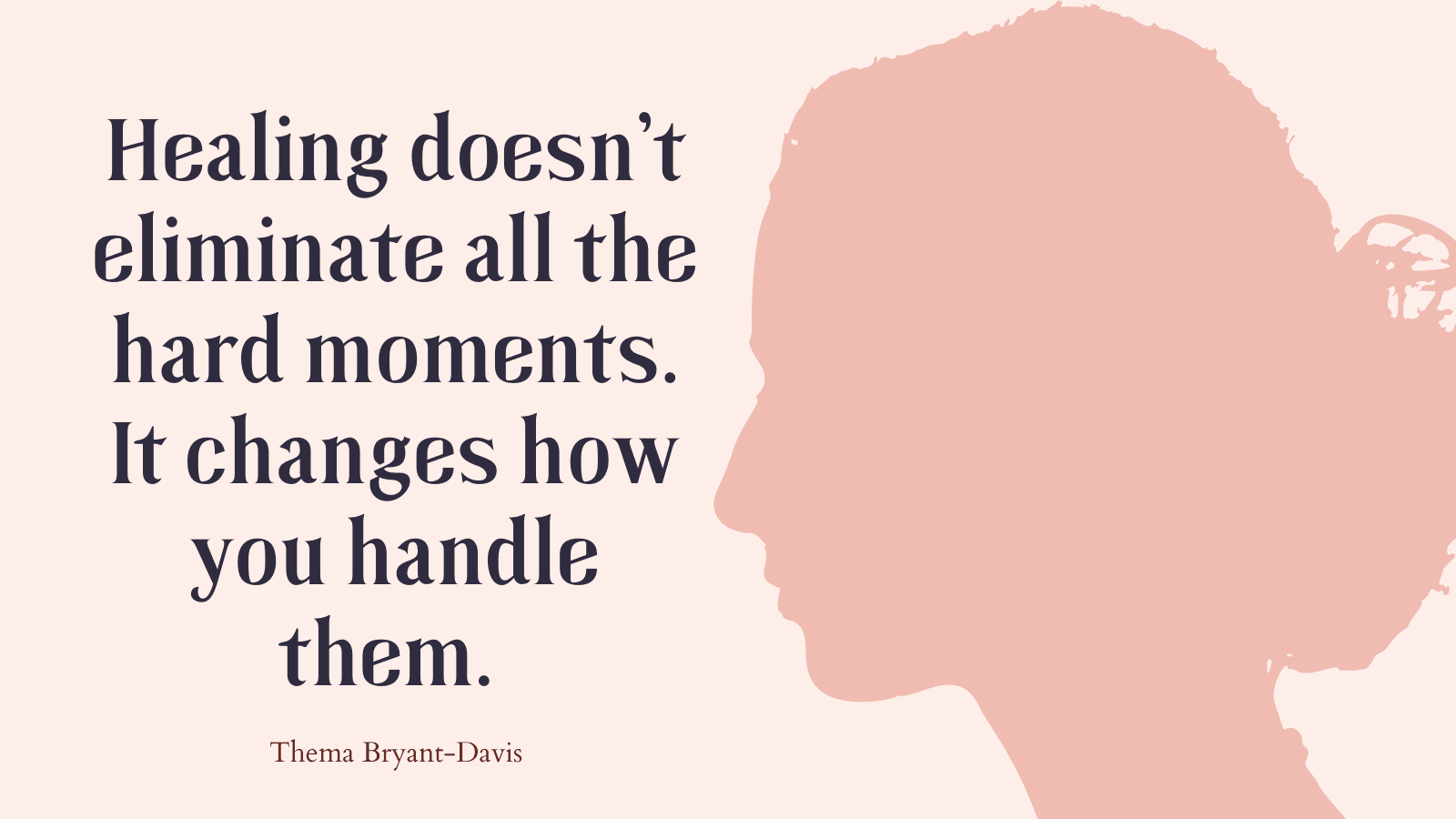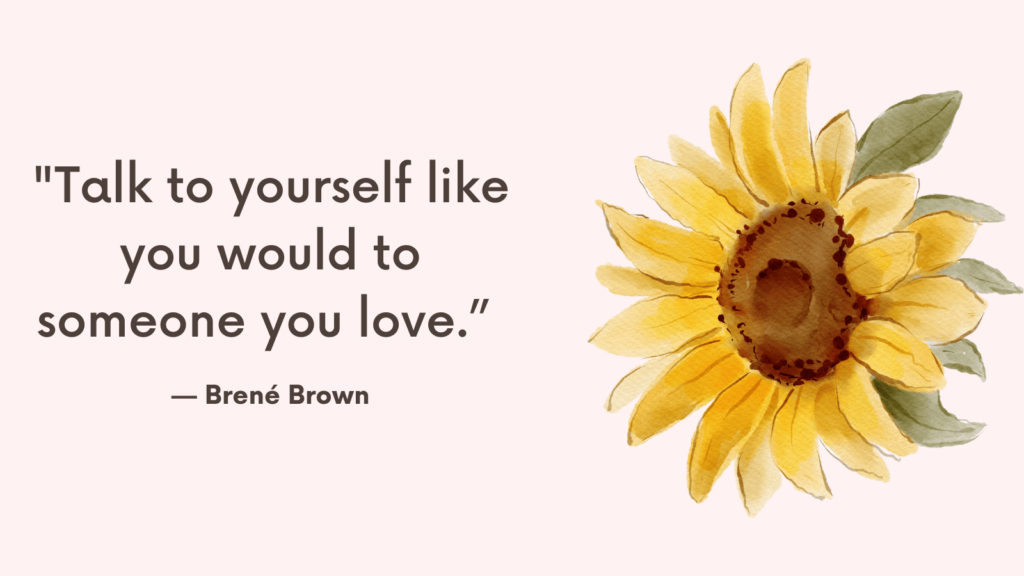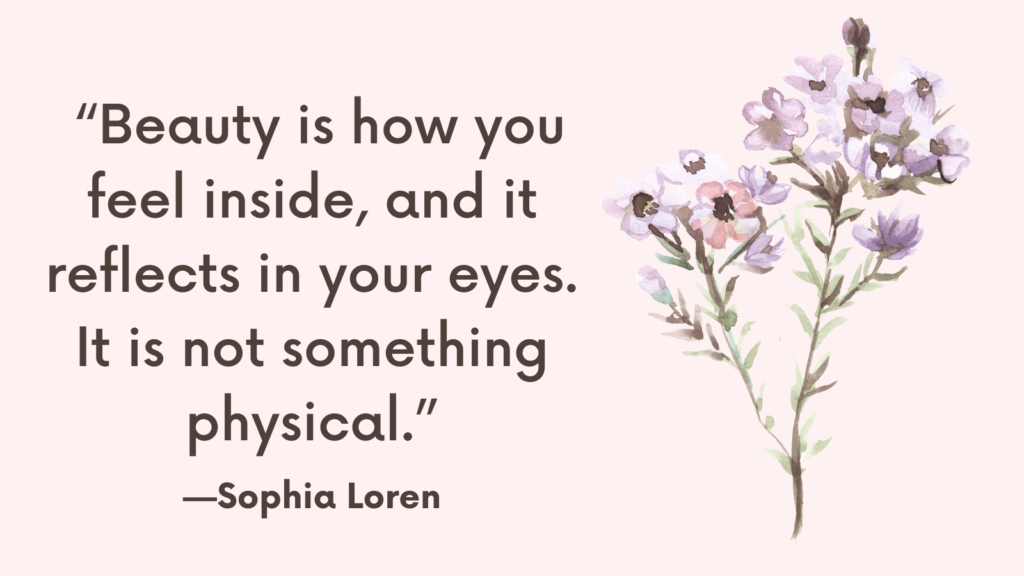Here is a 30 day self love challenge that will change the way you feel about yourself and change your life in thirty days.
Self-love isn’t self indulgence.
It isn’t selfishness—in the negative interpretation of that word.
The goal here is to balance between taking care of yourself and tending to your true responsibilities to others without obsessively focusing on them or feeling overly responsible.
Self-love can mean “me first,” but usually, “me too.”
What Is Self-Love?
Self-love is critical to our happiness.
If we’re not used to it, it will take some practice.
To define self-love, we need to first explore what self-love is not.
Related: How To Start A Self Love Journey? Top 10 Powerful Ways to Love Yourself More
What Self-Love Is Not
Self-love is different from self-absorption or narcissism.
People who are love themselves take care of themselves while being attentive to the feelings and needs of those around them.
If anything, being loving with ourselves helps us take better care of other people.
Self-absorption, on the other hand, keeps us stuck in our own world and makes no room for anything else.
Self-love is different from self-pity.
Self-pity is a form of self-absorption. We get caught up in our own problems and we become oblivious to the world around us.
Self-love, on the other hand, allows us to see our suffering as a shared human experience. Unlike self-pity, self-love affords a sense of proportion to our situation so that we can accept and deal with our pain in more constructive ways.
Self-love is different from self-gratification.
Self-gratification is an impulse to “treat ourselves,” even when it’s not in our best interest.
Oftentimes, the most loving thing we can do for ourselves may be to not buy something we don’t need, or eat something that’s not healthy.
Self-love is different from self-esteem.
Self-esteem is based on self-evaluation. It’s our way to relate to ourselves with understanding and acceptance.
While self-love is a gentle and caring attitude toward our own pain and needs. It may contribute to increased self-esteem, but it does not depend on it.
Related: How To Manifest Self Love? Best 9 Ways To Grow In Self-Love
6 Signs of Lack of Self-Love
Lack of self-love comes from being unable to accept or forgive our imperfect selves. The following are some signs you might lack self-love
- Staying in dysfunctional or abusive relationships because you don’t believe you deserve better;
- Feeling uncomfortable in your body;
- Starving yourself, binge eating, or hurting yourself to distract yourself from your real pain;
- Neglecting your basic needs for sleep, nutrition, and exercise;
- Overworking yourself because you don’t know how else to find validation;
- Lashing out or shutting down when feeling criticized because you are ready to believe anything bad about yourself.
What Self Love Sounds Like?
I try to be understanding and patient toward the aspects of my personality that I don’t like.
I give myself the caring and tenderness I need in hard times.
I try to remind myself that feelings of inadequacy are a shared human experience.
I see the difficulties as part of life that everyone goes through.
I try to approach my feelings with an attitude of curiosity and openness.
When I fail at something important to me I try to keep things in perspective.
Related: Top 23 Self Love Questions (+FREE Self-Love Resources)
30 Day Self Love Challenge to Grow In Self-Love
Day 1 – Write Down Your Goals For The Year
Start with a list of goals for the year and turn them into smaller goals to achieve each month.
Ask yourself what you would like to have happened in your life this year. What good would you like to attract into your life? What would you like to accomplish? What blocks, or character defects, would you like to remove? What would you like to replace them with?
Write down your answers. there is a powerful force motivated by writing down goals.
This gives you a direct but is also an affirmation that you’re committed to fully living life in the year to come.
Day 2 – Define Your Values
Determine the ethics and ideals you want to live by – the code of conduct we want to follow.
For example, staying sober, honoring your commitment to yourself, being authentic, honesty, compassion, etc.
List of Values
Day 3 – Set Healthy Boundaries
Having and setting healthy boundaries is essential in every recovery process, especially growing in self-love.
Boundaries require you to let go of guilt and shame and to change your beliefs around what you think you deserve and what you should tolerate and what you shouldn’t.
The clearer your thinking about this becomes, the easier you find it to set healthy boundaries.
Setting healthy boundaries doesn’t mean pushing people away or trying to control them. It means that we’ve changed, that we mean what we say and this will make others take us seriously.
Think about your relationships with other people and think back to times when you felt hurt. For instance, you might have felt bad having to talk about a private matter because couldn’t say no. Do you think you should set a limit here?
What makes you angry? What have you had enough of? What doesn’t feel right? What can’t you stand? What makes you uncomfortable? What do you want? What don’t you want?
Related: How to Firmly Establish and Enforce Healthy Emotional Boundaries?
Day 4 – Know When To Compromise
Sometimes it’s better to give in to someone else’s wishes for the benefits of the relationship. But sometimes compromise is dangerous.
Notice when you’re tempted to compromise your standards in order to gain the approval or love of someone else. If it could lead to breaking your values, then maybe it’s not a good idea.
Day 5 – Stop Rescuing People
While there is nothing wrong with offering support and trying to solve someone else’s problem, if you’ve done everything you could and there’s nothing left for you to do but worry, then you need to let go.
Letting go doesn’t mean we don’t care. Letting go means we stop trying to do the impossible—controlling that which we cannot.
In your mind, repeat to yourself, “My job is done here, it’s up to them now. The ball is in their hands.”
Related: How to Heal Codependency and Savior Complex? Top 12 Strategies to Overcome Codependency For Good
Day 6 – Move When It’s Time
If you are unhappy with where you are, then there is no reason to stay there.
You may be learning hard lessons today, but don’t close off your ability to move and learn new lessons somewhere else.
Day 7 – Nurture Self Care
There isn’t a guidebook for taking care of yourself.
Ask yourself what do I need to do to take of myself today? And listen to that voice inside.
Related: Take Care of Yourself: (45 Simple Self-Care Practices for a Healthy Mind, Body & Soul)
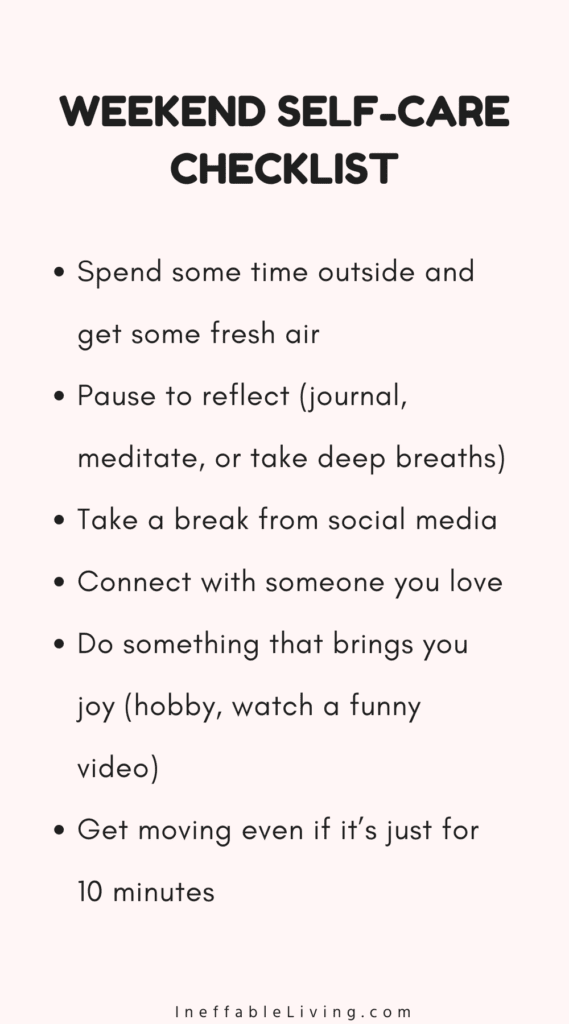
Day 8 – Say Yes to Yourself
Saying “yes” to someone is easy. It makes us feel good and accepted. The more we say yes, the more they ask of us and we mistakenly think this must be an expression of even more love.
Soon, we begin to feel bitter about our relationships. Can’t they do it themselves? Why am I the only one helping here?
This is when you need to start saying yes to yourself more. Balance your time and your energy with those around you. Make sure your wellbeing comes first.
Day 9 – Deal with Painful Feelings
Feelings of hurt or anger can be difficult to face. We can feel so vulnerable, out of control, and powerless when these feelings are triggered.
We may try to avoid these feelings by blaming people around us, or indulging in bad habits that will numb these feelings.
While avoidance might give us temporary feeling of relief, we’re in fact, only postponing facing our pain and maybe even reinforcing it.
The goal here isn’t to seek out hurt feelings or dwell unnecessarily on them, but rather to stop holding others responsible for your own pain, and to take responsibility for all your feelings by allowing yourself to feel them, learn from them, and let them go.
Real power comes from allowing yourself to be vulnerable enough to feel hurt and knowing that you can take care of yourself, even when you feel emotional pain.
Experiencing feelings can be a challenge if you had no previous experience or permission to do that before.
So take out your journal and write, “If it was okay to feel whatever I’m feeling without being judged as bad or wrong, what would I be feeling?”
Then write whatever comes to mind.
Related: 6 Simple Ways to Manage Difficult Emotions and Control Them
Day 10 – Accept Help
Some people have gone without love, used to having their needs rejected by their primary caretaker and might even feel shame for having needs at all.
As children they got the message that they are wrong for having feelings or needs and for wanting to be close – It’s difficult, maybe impossible, for a child to understand that it’s a problem that the parent has, rather than them.
But not reaching out for help comes at a great cost: you’re missing out on intimacy and connection with safe people. You’re missing out on all the richness of real relationships – love, kindness, and support.
It’s impossible to guarantee to yourself that you would always know who’s safe and who isn’t or that you won’t be hurt again.
This is when you need courage.
The courage to connect, and to risk. The courage to be yourself, and to be vulnerable.
And the courage to be compassionate towards yourself, and forgive yourself when you make a mistake.
Related: Learning How to Receive: (7 Steps to Opening Up And Unlock The Power of Receiving)

Day 11 – Stop Throwing The Blame Around
Blame is a healthy stage of grieving or letting go. But if you stay too long in this stage, blame becomes counterproductive, keeping you stuck and preventing you from taking effective action.
Blaming ourselves can turn into self-contempt; blaming others can turn into resentment and fuel the victim within.
If you’re going through a loss or disappointment, take your journal out and give yourself ten or twenty minutes to blame without censorship.
Once you get it all out, think about the things that you can do to change this situation and let go.
Day 12 – Take Responsibility for Yourself
Most people are good at taking responsibility for other people, but they never learn to take responsibility for the most important person in their lives – themselves.
You might instinctively feel responsible for the feelings, thoughts, choices, and problems of others – but never feel responsible for your own feelings, thoughts, choices, and problems.
You might believe, at an unconscious level, that others are responsible for your happiness, just as you are responsible for theirs – this is caretaking.
Caretaking doesn’t work. People end up feeling hurt and angry, you end up feeling used and victimized.
The most generous act you can perform is to take responsibility for yourself – for what you feel, think, want, need, and choose, and to trust that others can take responsibility for themselves.
Related: How To Get Over Yourself And Stop Feeling That The World Owes You Anything
Day 13 – Stand Up for Yourself
Many people find it easier to come to the defense of others and fight their battles, but they struggle to stand up for themselves and rally to their own behalf.
There are times when you can walk a loving, compassionate path, but there will also be times when you need to stand up for yourself – when you’re being used, victimized, lied to, manipulated, or otherwise violated.
Learn to identify when you are feeling victimized, and why you are feeling victimized. And learn to own your power.
Sometimes, the answer is to set boundaries and not act on the urge to rescue that person from logical consequences of his or her behavior, other times you need to fight for yourself and your own rights.
Day 14 – Protect Yourself From Negative Influences
Be aware of the negative influences in your life and make a choice to stay away, if not physically, at least emotionally.
Spend less time with negative people and start seeking positive influences. Find a support group of like-minded people, or a helpful and positive friend.
Day 15 – Nurture Your Relationships
A relationship isn’t the beginning of your life and shouldn’t become your life. A relationship is the continuation of your life.
You can only be happy in a relationship when you’re happy without one.
But self-love is not done apart from your relationships. Growing in self-love is done by learning to own your power and to take care of yourself in relationships.
In your journey of growing in self-love, your goal is not only to acknowledge your power to take care of yourself in your relationships but to also learn to be intimate with people when possible.
Think about your relationships and ask yourself the following questions:
* Do I need to detach from someone who I’ve been trying to control?
* Is there someone I’ve been avoiding because I’m afraid to take care of myself with that person?
* Is there someone I need to reach out to, or show love? Do I need to make an amend?
Related: Am I Controlling In My Relationship Quiz
Day 16 – Overcome Fear
Fear can hold many of us back: fear of failure, fear of what others might think, fear of making a mistake, even fear of success.
You might find yourself refraining from taking action, until eventually life becomes limited.
You might find yourself thinking, “I can’t do it well enough!” or, “Look at what happened last time!” or, “What if . . .?”
This sort of statements usually reflects shame disguised as fear.
Remind yourself that doing your best is good enough. And that even your failures and mistakes may turn out to be important learning experiences that are necessary for an upcoming success.
Feel the fear, but do it anyway.
Related: How Do You Find Courage In The Face Of Fear? 9 Proven To Overcome Avoidance (& Live Fully)
Day 17 – Deal With Panic and Anxiety
Many people experience panic and anxiety attacks.
Remind yourself that this too shall pass, but also help yourself calm down by doing the following:
Breathe deeply. When we panic, our breath becomes shallow, which only feeds panic. By deliberately breathing slowly and deeply, we can change our panic reaction and actually calm down.
Don’t respond to your panic with more fear. The fearful thoughts we engage only feed our panic. By not reacting to these thoughts and simply responding with something like, “Yeah, whatever,” and shifting our focus, we allow panic to pass without feeding it.
If panic and anxiety are a continual problem, seek professional help.
Day 18 – Let Go of Guilt
Most of the time, the things you feel guilty about are not your issues.
Someone else would violate your boundaries, and when you challenge their behavior, the person gets angry and defensive and you feel guilty.
Guilt prevents us from setting the boundaries that would be not only in our best interests, but also in other people’s best interests.
Don’t allow yourself to be controlled by guilt.
You’re not crazy or wrong for setting boundaries and to insisting on appropriate treatment.
Day 19 – Accept Anger
Being grateful and positive, doesn’t mean you shouldn’t feel angry.
Anger is a healthy emotion.
We don’t need to seek it out or dwell in it, but we shouldn’t ignore it, either.
Growing in self-love means that you need to shamelessly feel all your feelings, including anger, but also to take responsibility for what you do when you feel angry.
Because if you don’t allow yourself to feel angry when you have to, you’ll end up feeling angry and hateful towards yourself.
Related: How To Manage Your Anger In Healthy, Effective Ways?
Anger Worksheets
Day 20 – Allow Yourself to Feel Good Feelings
When talking about facing our own feelings, we often focus on pain, fear, and anger. But there are other feelings available that you need to allow yourself to feel.
Many people feel guilty to allow themselves to feel good feelings like happiness, joy, peace, contentment, love, closeness, excitement, etc.
Some people are always waiting for the other shoe to drop and constantly sabotaging their good feelings.
It’s okay to let yourself feel pleasurable feelings without analyzing or worrying about the future and about what other people are feeling.
Day 21 – Acting As If
“Acting as if” can be a powerful tool to practice positivity when you don’t have enough motivation to act positively.
Making a conscious decision to “act as if” can help you shift your feelings easily and unstuck yourself.
One study conducted by Amy Cuddy, a researcher at Harvard University, revealed that High power poses increased testosterone by 20 percent and decreased cortisol (stress hormone) levels by 25 percent, which helps boost confidence and reduce stress.
The most well–known and versatile high power pose is “The Wonder Woman” pose where you simply stand tall with your chest out and your hands on your hips.
Day 22 – Express Gratitude
Every day we face challenges, interruptions, delays, and changes.
We often feel overwhelmed or are busy preparing for the next challenge, we can’t see the lessons in these experiences.
A powerful way to get yourself through the most stressful of times, is expressing gratitude. Learn to say thank you for these challenges, because only then are you going to be open to learn the lesson.
Start practicing gratitude by writing at least 5 things you’re grateful for everyday, until gratitude becomes a habit.
Gratitude Journaling Prompts
Day 23 – Stay in the Present Moment
One of the main reasons behind our worries and fear is constantly asking ourselves the question “What’s going to happen?”
Whether you ask this about our careers, relationships, recovery, it’s easy to tangle yourself up in worrisome and fearful thoughts
No one can or should predict the future. Worrying about what’s going to happen next prevents you from functioning effectively today.
The best contribution to your future is to stay present, do your best and assure yourself that what’s going to happen tomorrow will be for the best.
Clear our mind of the residue of yesterday and fears of tomorrow.
Now is the only time you possess. And it is enough.
Related: How To Meditate? A Beginner’s Guide To Meditation
Day 24 – Face Your Problems
Many of us avoid facing our problems. This denial became a way of life—our way of dealing with problems.
We often spend more time and energy reacting to a problem than we do to solving it. We miss the lesson – the point from having a problem.
A problem doesn’t mean life is horrible or that you’re a defective person.
Problems are our way to grow up as individuals and become mentally stronger.
Start facing your problems. Make sure the problem is yours, because if not, then maybe you should consider setting appropriate boundaries.
Seek the best solution. Sometimes this means setting a goal and taking an action, or asking for help, or gathering more information, or letting go.
Learn your lesson and trust your ability to solve any future problems.
Day 25 – Become Mentally Stronger
You don’t always have to be strong.
Sometimes, strength is expressed in being vulnerable, in allowing yourself to make mistakes, in allowing yourself to feel scared.
Sometimes strength is expressed in allowing yourself to cry in front of others, in opening up about your pain and hurt.
Part of loving yourself is to give yourself permission to “fall apart” when you need to.
Related: Building Mental Strength: 13 Things Mentally Strong People Don’t Do

Day 26 – Accept Imperfection
Why do we hurt ourselves by thinking that we’re inferior while believing that others are perfect?
The expectation of perfection whether from us or other people is never valid.
Expecting yourself to be perfect slows the process of growing in self-love – it put you in a guilty and anxious state.
Remind yourself that it’s okay to be who you are and that doing your best is good enough.
This doesn’t mean that we don’t have to learn from our mistakes or that we shouldn’t improve. It simply means that encouraging and approving of ourselves is the best way to help ourselves stay on track.
Start accepting who you are – accept your past, your limitation and your strengths, your physical self, as well as your mental, emotional, and spiritual self.
Try This: Self-forgiveness Practice
1. Think of a situation that you’re struggling to forgive yourself for.
2. If you could do it over, what would you do differently?
3. What can you say to your past self to offer compassion during that situation or experience?
4. Use this formula for your self-forgiveness affirmation or you can modify it as needed.
I accept that I’m human and I make mistakes.
I forgive myself for
I release myself from
5. Try writing an apology to yourself for being self-critical and harsh.
A quality apology includes three parts
(1) taking responsibility for our actions and their impact,
(2) expressing regret, and
(3) offering to fix things and make amends.
Related: Raising low self-esteem: 18 Ways to Build High Self-Esteem
Day 27 – See The Good In Yourself, Too
Most people find it difficult to see the attributes and beauty in themselves.
People mirror back our qualities, the negative and the positive ones. What you don’t like in others is probably what you don’t like in yourself. By the same token, the attributes and strengths you like in others mirror your own good qualities.
Choose three people in your life whom you admire and respect. Make a list of the qualities they have that you like most.
Now, ask yourself how many of these qualities you have, as well.
Related: How To Manifest Self Love? Best 9 Ways To Grow In Self-Love
Day 28 – Negotiate Conflicts
Conflicts are part of relationships—with friends, family, loved ones, and at work.
It’s important to face these conflicts and solve problems in relationships or else both people will end up with unresolved feelings of anger and victimization that intensify the problem and waste time and energy.
Problem-solving and conflict negotiation skills are acquired and improve with time and practice.
Some problems can be worked out and worked through. Other times, the problem is a boundary issue we have, and there is no room to negotiate.
To resolve conflicts, we must be willing to identify the problem and what both people really want and need, let go of blame and shame, be flexible, and focus on possible creative solutions.
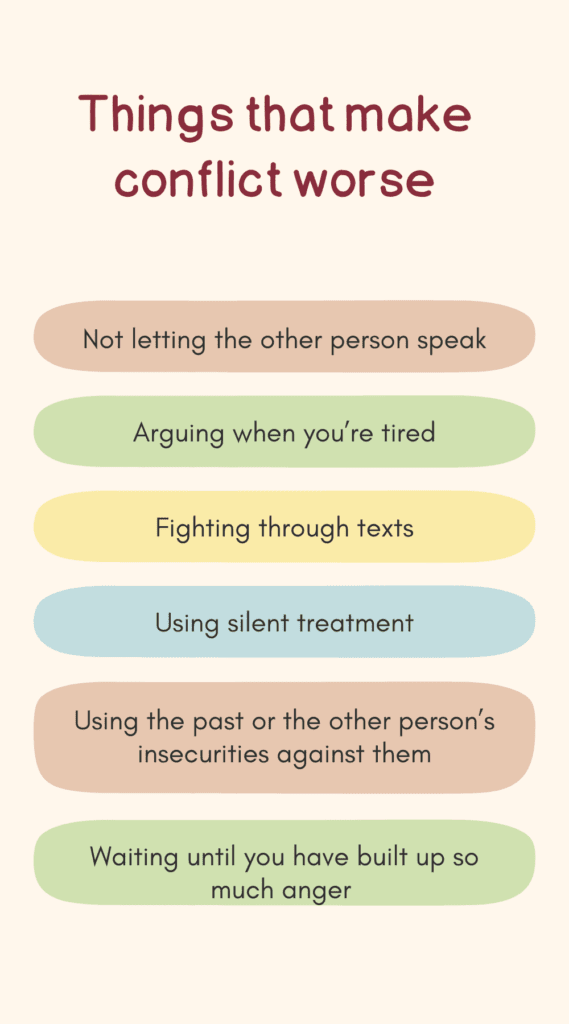
Day 29 – Give
Becoming a healthy giver can be a challenge.
Many of us got caught up in compulsive giving—usually motivated feelings of guilt, shame, obligation, or pity.
But compulsive giving don’t work. It backfires.
Knowing this, you might have stopped giving in order to focus on yourself and on growing in self-love.
However, healthy giving is part of growing in self-love.
The goal is balance giving that is motivated by a true desire to give, with an underlying attitude of respect for yourself and others.
The goal is to give, and not feel victimized by our giving – to choose what you want to give, to whom, why, and how much.
Ask yourself the following questions:
* Are you giving because we want to, or because you feel it’s your responsibility?
* Are you giving because you feel guilty, ashamed, or superior?
* Are we giving because you are afraid to say no?
* Are you giving so that people will like you? Are you giving to prove you are worthy?
* Are the ways you are trying to assist people helpful, or do they prevent others from facing their true responsibilities?
Growing in self-love includes a healthy cycle of giving and receiving. It might take time to learn how to give and receive in healthy ways. Be patient. Balance will come.
Day 30 – Find Balance
Loving yourself doesn’t mean going from one extreme to another – from taking care of everyone but ourselves to refusing to focus on anyone’s needs but our own.
The goal of growing in self-love is to find balance.
You can learn to give to others while taking responsibility for yourself.
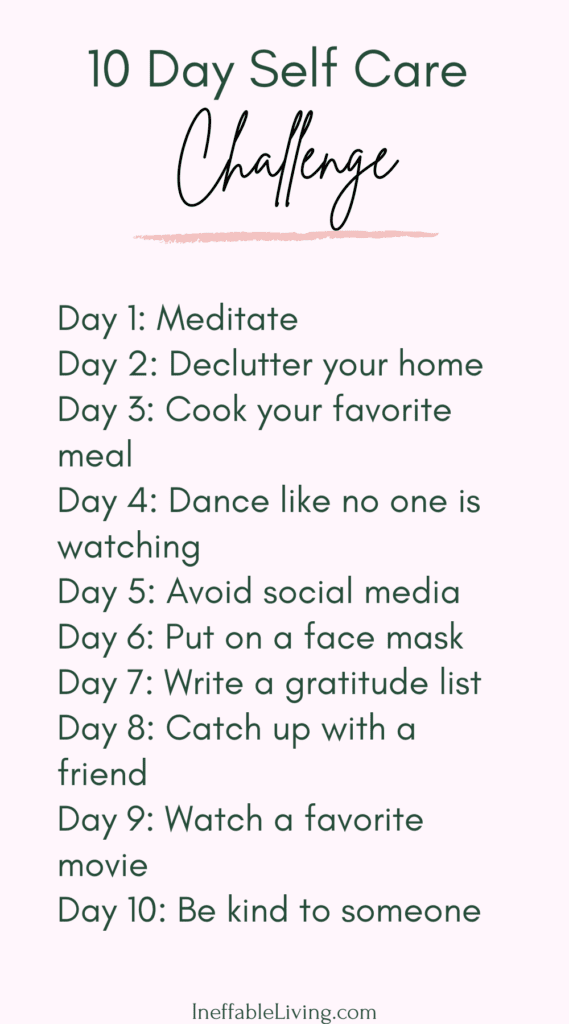
Conclusion
Self-love means being responsible for yourself while choosing to no longer be victims.
Self-love doesn’t lead to isolation and self-indulgence; rather it helps you better love others, and learn to let them love you.
Self-love isn’t selfish. It’s your way to love others.
